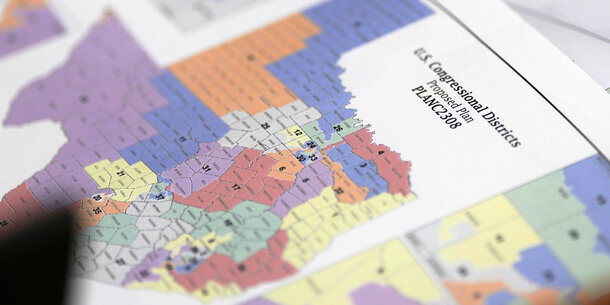Today the petitioners in Ohio Organizing Collaborative v. Ohio Redistricting Commission joined petitioners from League of Women Voters of Ohioet al. and petitioners from Bria Bennettet al. petitioners in responding to Senator Robert McColley and Representative Jeff LaRe’s motion to dismiss the petitioners’ cases, which challenge the state’s legislative maps as partisan gerrymanders. The motion to dismiss asks the court to vacate all prior orders invalidating maps, arguing that the anti-gerrymandering provisions in the Ohio constitution are outside the Ohio Supreme Court’s jurisdiction. In response, the Ohio Organizing Collaborative petitioners’ filing joins the other petitioners in arguing that the court properly exercised its jurisdiction and should maintain its precedent. It also adds that, if the court were to grant that motion, it would render its past rulings on the constitutionality of the commission’s maps void. Because those rulings were the reason that the commission redrew its maps, nullifying them would cast doubt on the validity of the maps drawn in September 2023 pursuant to court order and potentially leave Ohio without legislative maps.
The Brennan Center for Justice at NYU Law and Reed Smith represent the following petitioners in the suit: Ohio Organizing Collaborative, CAIR-Ohio, Ohio Environmental Council, Ahmad Aboukar, Crystal Bryant, Samuel Gresham Jr., Prentiss Haney, and Pierrette “Petee” Talley.
Yurij Rudensky, Senior Counsel in the Democracy Program, Brennan Center for Justice at NYU Law, had the following comment:
“With their motion to dismiss, Senator McColley and Representative LaRe have asked the Ohio Supreme Court to forego its role as a check on the commission and as the enforcer of the representational fairness provisions in the Ohio constitution. Their arguments are nothing new and the court has already rejected them. A change on the bench is not reason to overturn prior decisions. Moreover, granting the motion could wipe out the order that gave the commission the authority to pass maps in September 2023 and leave Ohio without maps ahead of the 2024 election.”
The response filed by the petitioners to the motion to dismiss can be found here. The objections filed earlier this month by the petitioners can be found here. For background on the case, see Ohio Organizing Collaborative v. Ohio Redistricting Commission.
Resources:
- “Ohio Proves Politicians Can’t Be Trusted to Draw Voting Maps” by Yurij Rudensky and Gabriella Sanchez, Brennan Center for Justice
- “Ohio Redistricting Commission Passes Partisan Gerrymandered Maps that Violate State Constitution, Deny Ohioans Fair Representation,” Brennan Center press release, Sept. 27, 2023
- “Ohio Republicans Steamrolling over Fundamental Voting Rights to Suppress Black Voices” by Jeniece Brock, policy and advocacy director, Ohio Organizing Collaborative, Columbus Dispatch
- “Plaintiff: Just like Jim Crow, commission 'robbing’ Black Ohioans of 'political power" by Sam Gresham, petitioner and chair of Common Cause Ohio, Columbus Dispatch
- “COVID Inequities Show Why Ohio’s Fair Map Mandate Must Not Be Ignored” by Jeniece Brock, policy and advocacy director, Ohio Organizing Collaborative, Cleveland Plain Dealer
- “Ohio Take Note: Fairness Is a Universal Value” by Tala Dahbour, policy director, CAIR-Ohio
- “How Gerrymandering Contributes to Environmental Injustice” by Callia Téllez, environmental policy fellow, Ohio Environmental Council

